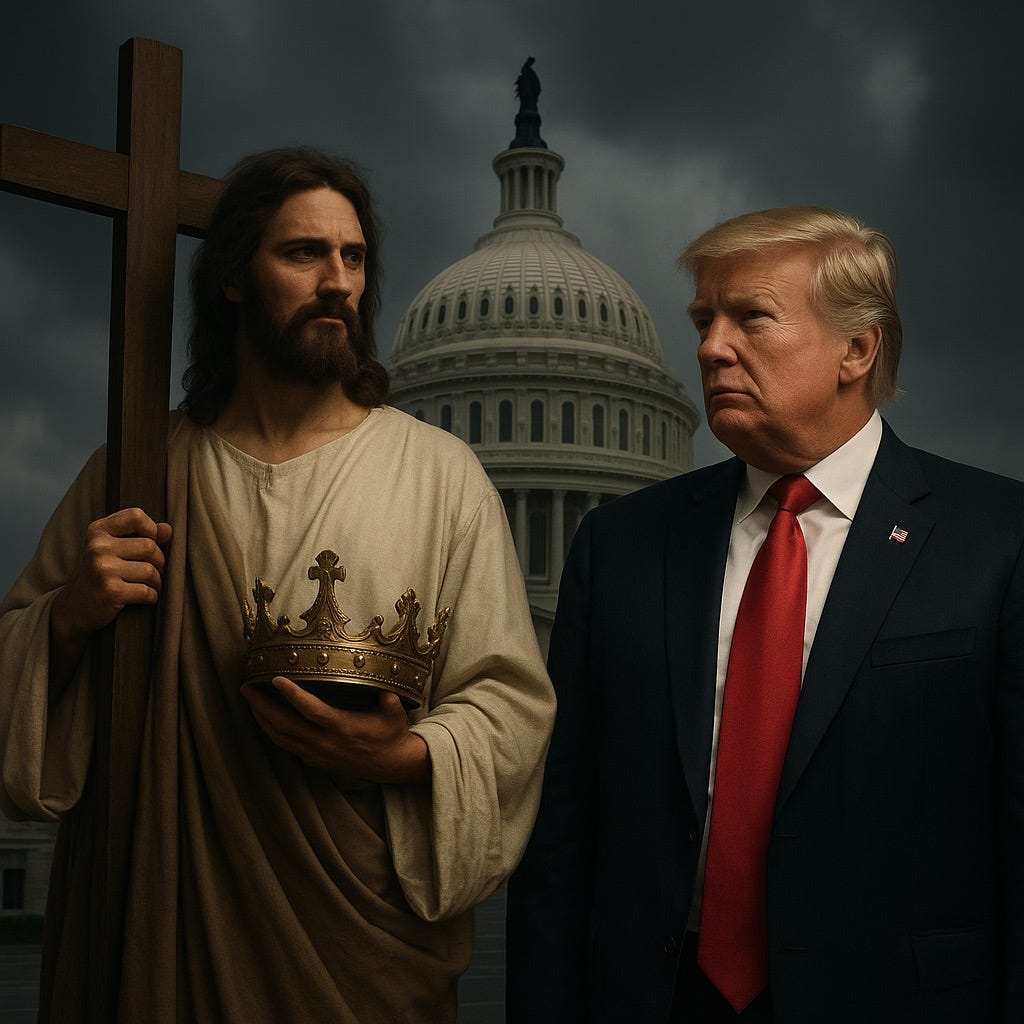Column openly endorses fusing faith with politics, raising urgent concerns of history repeating itself.
Disclaimer: I realize that we’ve been sending out many newsletters the past couple of weeks. Developments around Charlie Kirk’s legacy are moving faster than almost anyone anticipated, and what unfolded this past week demands close scrutiny.
On September 28, 2025, Blaze Media published a column by Rich Lusk, a theologian and pastor of Trinity Presbyterian Church (CREC) in Birmingham, Alabama, where he has served for more than two decades. He holds a B.S. in Microbiology from Auburn University and an M.A. in Philosophy from the University of Texas at Austin. Lusk is also the author of several theological works including Paedofaith (en.wikipedia.org, theblaze.com).
Lusk’s column, “Charlie Kirk’s legacy exposes a corrosive lie and now it’s time to choose,” does more than reflect. It endorses. He frames the Kirk memorial as evidence of “Christian nationalism in nascent, immature form” and argues that America must choose “Christ or chaos” (Blaze Media, September 28, 2025, https://www.theblaze.com/align/charlie-kirks-legacy-exposes-a-corrosive-lie-and-now-its-time-to-choose).
He rejects “third-wayism,” the idea that Christian leaders might remain politically neutral. According to Lusk, neutrality is not only impossible but dangerous, because it empowers progressivism. The only acceptable path, in his view, is full alignment with Christian nationalism.
That stance merits serious criticism. By asserting that one does not even need to be a Christian to support Christian nationalism, Lusk detaches the movement from faith itself. What emerges is the idea that secular rulers or political movements can wear Christian identity like a flag even if they do not live by its message. Faith becomes a cultural brand rather than a spiritual transformation.
The “Christ or chaos” framing shuts down disagreement. If you resist Christian nationalism, you are cast as supporting chaos. That binary is a rhetorical trap. It erodes the pluralism of ideas that undergirds American liberty. The founders deliberately guarded against fusion of church and state to prevent religion from being weaponized by political systems.
A Shift in Language
For years, the term “Christian nationalism” was used mainly by critics to describe a movement they opposed. Even those who believed in bringing faith into politics avoided the phrase, viewing it as negative and misleading. What is unfolding now marks a major shift. Voices like Lusk are not only using the term but embracing it. What was once a warning label is now being adopted as a public identity. This change accelerates the movement and grants it legitimacy.
History Shows the Consequences
The trajectory being endorsed is not new. Emperor Constantine legalized Christianity and merged it with the Roman Empire, turning the faith into a political institution. At first, this appeared to be a victory. Christianity was no longer persecuted. But soon it became clear that the church was being reshaped to serve imperial ends.
Emperor Justinian carried this further. He wrote Christian doctrine into law, declared heresy a crime, and empowered the church to enforce conformity. What had begun as a religion of conscience and conviction became a system of control. Those who dissented, including Jews, pagans, and rival Christian sects, were crushed under the weight of church-state power.
That legacy lasted for centuries. Christianity ceased to be the voice of redemption and became instead a pillar of state authority. Persecution followed in its wake.
A Modern Parallel: The Secular King
In the present moment, Donald Trump is often viewed by many in the religious right not primarily as a man of personal piety but as a ruler-king, likened to the biblical Cyrus. In this view, he is a secular figure raised up to protect God’s people. His role is not spiritual but political, yet it is cast in divine terms.
This mirrors the dynamics of Constantine and Justinian. Secular leaders take on a religious mantle, unifying political power through the banner of Christianity. The result is the binding of faith to the authority of the state. Once faith is tied to such figures, it stops being an independent voice and becomes a political instrument.
The Accelerating Pace
The speed of these developments is what makes the current moment urgent. Blaze Media’s column is not a fringe opinion. It is a prominent platform openly calling for Christian nationalism and celebrating that even non-Christians can embrace it. This accelerates the shift from faith as redemption to faith as political identity.
It is happening quickly, and it risks sweeping Christians along with it. Justifiable anger at cultural decline is being harnessed, but not always in ways that remain faithful to Christianity’s core. Believers may not realize how fast their faith is being redirected until it is already bound to political machinery.
What Is at Stake
Charlie Kirk’s legacy deserves respect. He inspired many and challenged Christians to speak openly about their beliefs. But invoking his name to legitimize Christian nationalism, especially in a form that allows secular co-opting, risks distorting that legacy.
The question is not whether Christianity should have a voice in America. It has always had a voice. The question is whether that voice will remain free or whether it will be tied to secular rulers, enforced by political authority, and used as a weapon of control.
History provides the answer. When church and state merge, faith does not flourish. It is twisted. Liberty does not expand. It collapses. Dissent is not tolerated. It is punished.
The developments surrounding Kirk’s legacy show that this danger is not abstract or distant. It is unfolding right now.
